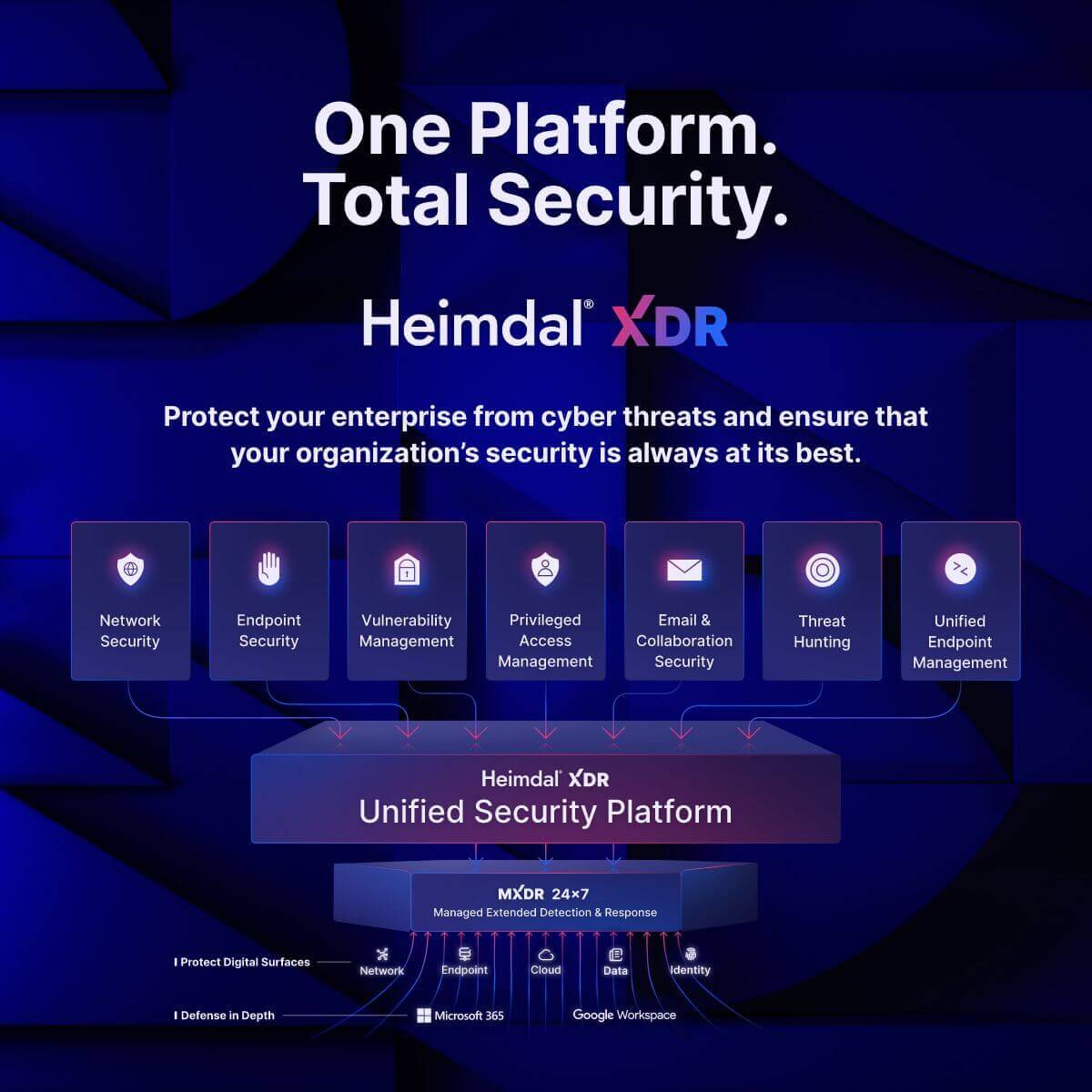Contents:
A growing number of MSPs are moving towards a platform approach for their cybersecurity tools. What’s behind the shift away from point solutions?
Imagine you’re packing your bag to go camping. You might need to cut some twigs for kindling, so you put a saw in your backpack. You need a can opener so you can cook some dinner – better bring one of them too. A knife is always handy. So are scissors. Maybe a tweezer if you get a splinter…
Or, you could just bring a Swiss Army Knife. A decent quality gadget would have all the tools you’d need for your trip – while saving you lots of space.
Today, many MSPs are doing something similar with their cybersecurity tools. They are using dozens of separate cybersecurity point solutions (45 on average, according to IBM) – which is a bit like packing numerous specialized tools for a camping trip.
By contrast, a cybersecurity platform is like a Swiss Army Knife – it lets you get all the same features, but in one single place.
This approach is growing in popularity. Gartner reckon that 75% of organizations are pursuing security vendor consolidation. Let’s learn why.
What Is a Cybersecurity Platform?
A cybersecurity platform is simply an environment where all your cybersecurity tools are consolidated into one place. Rather than having to log into several different vendors’ portals to carry out individual security tasks, the platform approach lets you do them all from the same environment.
The platform approach depends on the vendor being able to provide enough tools in one portal. At a minimum, it should include things like:
- Network security;
- Patch and asset management;
- Privileged access management;
- Endpoint security;
- Email security;
- Threat hunting;
- Compliance reporting.
So, rather than having separate tools for network security, endpoint management or email scanning, you choose a platform where it’s all accessed in one place.
What Problems Are Cybersecurity Platforms Trying to Fix?
Cybersecurity platforms aim to solve several common problems facing Managed Service Providers.
1. Addressing Vendor Complexity
According to analyst IT Harvest, there are currently 3,627 cybersecurity vendors on the market, across 17 categories and 1000+ subcategories. The sheer variety and quantity of point solutions available makes for an enormous headache when it comes to choosing tools.
By contrast, cybersecurity platforms aim to simplify Managed Service Providers’ lives. You get everything you need in one package.
Writing in Cybersecurity Dive magazine, IT journalist Matt Kapko sums up the issue:
There is a glut of cybersecurity tools that do one thing. Many organizations pay for dozens of these products or services, some of which go forgotten or otherwise unused.
Matt Kapko
2. Tackling Alert And Portal Fatigue
Writing on the Reddit MSP forum, one professional explains that:
Alert and portal fatigue is a huge deal, especially for small MSPs who do not have dedicated staff.
Reddit User on Alert and Fatigue
If you have to log in to several different systems throughout the day to address issues and alerts, you waste hours of time on (often) unnecessary tasks. A cybersecurity platform means you get all your alerts – and can take action on them – from a single dashboard.
3. Waste
If MSP staff are using multiple security tools from different vendors, there are many ways that time and money can get wasted.
For example, when they use multiple point solutions, MSPs often assign different apps to different employees. But this has obvious drawbacks.
- First, information gets siloed – so you may miss threats or miscommunicate.
- Second, if the employee who’s specialized in your PAM app (for example) is on vacation or leaves the business, you are suddenly missing vital know-how.
- Third, it’s a highly inefficient use of resources. Why have five people using five tools part of the time, when you could have one person using five tools (in the cybersecurity platform) all of the time?
Robertino Matausch, Heimdal’s Head of Pre-Sales, uses an analogy with orchestras to describe the problem:
In a classical music orchestra, it would make no sense to have one conductor for the wind section, another for strings, another for brass – you just have one person overseeing it all.
Robertino Matausch, Head of Pre-Sales, Heimdal
The same principle underpins cybersecurity platforms.
Business Benefits of Cybersecurity Platforms
The MSP business model is challenging in many ways. From marketing your company to finding good staff and remaining profitable. If you also have to manage dozens of costly subscriptions to point solutions, that’s just one more headache.
Cybersecurity platforms help MSP founders to run their businesses more efficiently, while also helping them scale. Here are some of the most important ways this approach helps:
1. A cybersecurity platform saves you money
A cybersecurity platform allows you to eliminate dozens of redundant point solutions from your tech stack. That can add up to significant savings on your annual business costs.
2. Reduce resource use
If all (or most) of your cybersecurity tasks can be carried out from a single platform, you can reduce staffing costs and do more with less.
To repeat the earlier point: why have several people using different tools, when you could have one person using one platform that includes all those same features?
3. Scale efficiently
Scaling is one of the biggest challenges for ambitious MSPs. There are many obstacles to growth, but disjointed point solutions are certainly part of the problem.
For example, if you win business with 10 new customers, you may have to hire five new employees to manage the additional workload from multiple point solutions. On the other hand, if you use a unified cybersecurity platform, you may only need to hire one or two additional employees to support the extra customers.
There’s also the question of automation – which is vital for scaling. Using a single, unified cybersecurity platform lets you easily automate many tasks, so you can continue offering services to more customers at a competitive price. The same isn’t possible if you use dozens of point solutions – you would have to hire more people and add more seats, thereby increasing your costs.
4. Compliance
Having a single cybersecurity platform makes compliance much easier. All your configurations can be viewed and managed from a single dashboard and verified by auditors. That’s much less risky than using lots of different tools that could be configured differently.
5. Better service = loyal customers
A cybersecurity platform allows you to offer better service to your customers. You can produce reports quickly and easily, monitor their entire environment, and resolve any problems fast. There are fewer opportunities for threats to ‘get through the cracks’. And that means you’re more likely to win repeat business.
You may like: Top KPIs for MSPs
Barriers to the Cybersecurity Platform Approach
While there’s undoubtedly growing interest in cybersecurity platforms among MSPs, not all companies are making the move just yet. Does this suggest MSPs prefer their existing set-up? Not necessarily.
According to Gartner’s research, the top reasons MSPs don’t consolidate their point solutions are time constraints and contracts:
- Time constraints: Shifting your entire MSP business and all your tools over to a single platform requires research, planning, learning and adaptation. If you’re running a busy MSP, you might conclude that it’s just easier to stick with what you’ve got.
- Contractual obligations: Some cybersecurity point solutions come with strict, inflexible contracts. This kind of vendor lock-in forces MSPs to keep using multiple vendors, even if it’s against their interests.
While these may be significant obstacles to migrating to a cybersecurity platform, they are hardly an endorsement of the status quo. Given the opportunity, it seems likely that many MSPs would prefer the cybersecurity platform approach, but are being held back.
The Widest Cybersecurity Platform: Heimdal®’s Extended Detection & Response (XDR) Platform
At Heimdal®, we’re convinced that MSPs would be better served by a single, powerful cybersecurity platform. If all your essential tools, reporting and controls are in one place, you can run a more efficient, productive and secure MSP.
That’s why we built our Extended Detection & Response (XDR) platform. It gives you best in class cybersecurity tools across a wide range of categories, all accessible in one, easy to use environment. What is more, we’re continually building out new features, making it even more powerful.

This unified approach offers several key benefits:
- Unified Security: Heimdal® XDR eliminates the complexity of managing multiple security solutions by providing a single, integrated platform. This ensures complete visibility across your organization, leading to faster and more accurate threat detection and response.
- Superior Detection & Response: With advanced AI/ML-based detection capabilities, Heimdal® XDR can detect threats faster and more accurately than traditional security solutions. It offers a unified high-fidelity view of your IT enterprise, enabling automated response actions to be taken quickly.
- Cost and Complexity Reduction: By consolidating multiple security technologies into a single platform, Heimdal® XDR reduces complexity and costs associated with managing disparate solutions. This simplifies security management and optimizes the utilization of SecOps and IT resources.
Key Features of Heimdal XDR:
- Next-Gen Threat Intel: Heimdal® provides advanced threat intelligence, telemetry, and forensics details using AI/ML predictive models and MITRE ATT&CK techniques.
- Automated Remediation & Response: The Action Center allows for efficient one-click automated and assisted actioning across your digital enterprise, enabling quick and effective response to potential threats.
- Integrated Threat Hunting: Empowers security teams with pre-computed risk scores, indicators, and detailed attack analysis for proactive threat hunting and investigation.
Unlike other solutions on the market, Heimdal® XDR offers several advantages:
- Unified Approach: Heimdal® XDR provides a comprehensive, unified platform for security, unlike SentinelOne and Sophos, which may require multiple products to achieve the same level of coverage.
- Advanced Threat Intelligence: Heimdal® XDR leverages advanced AI/ML-based detection capabilities and threat intelligence to provide superior protection against evolving threats.
- Simplicity and Efficiency: By reducing complexity and consolidating security technologies, Heimdal® XDR offers a more efficient and cost-effective solution for organizations of all sizes.


 Network Security
Network Security
 Vulnerability Management
Vulnerability Management
 Privileged Access Management
Privileged Access Management
 Endpoint Security
Endpoint Security
 Threat Hunting
Threat Hunting
 Unified Endpoint Management
Unified Endpoint Management
 Email & Collaboration Security
Email & Collaboration Security












